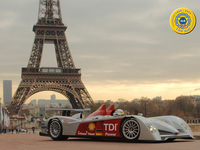Bosch Clean Diesel Technology: Proven Success On, Off the Track
FARMINGTON HILLS, Mich., Aug. 6, 2007 -- Bosch is realizing success with its advanced clean diesel technologies both on the track, with endurance race cars, and off the track, with passenger vehicles. Over Labor Day weekend, consumers will have a chance to see the advantages of clean diesel technology for themselves.
On Sept. 1, 2007, Bosch's diesel common rail technology can be seen in action on the Audi R10 TDI, during the inaugural running of the Detroit Sports Car Challenge presented by Bosch. The American Le Mans Series race takes place on the Raceway at Belle Isle Park in Detroit from 3:15-6:00 p.m. ET.
"Bosch has played a vital role in the advancement of clean diesel technology in the automotive industry," Chris Qualters, director, marketing, North American Diesel Systems, Robert Bosch LLC. "The success we've seen both on and off the race track proves that clean diesel technology is a powerful and viable powertrain solution that offers consumers improved fuel economy, reduced emissions and increased performance."
On the track, as development partner, Bosch supplies the specially adjusted high-pressure pumps and piezo-inline injectors for the diesel common rail injection system on the Audi R10 TDI. The introduction of diesel technology in the Audi R10 has proved a success. In 2006, the Audi R10 made racing history as the first diesel-powered car to win the prestigious 24 Hours of Le Mans, a feat repeated this year. Additionally, the Audi R10 capped off a successful first season by becoming the 2006 American Le Mans Series LMP1 race class champion. The success continues into 2007, with the Audi R10 leading its race class in the American Le Mans Series.
The technology that assists in the Audi R10's racing success is available to American drivers today and offers numerous advantages. Today's diesel passenger vehicles, in comparison to gasoline vehicles, provide an average increase in fuel economy of 30 percent; a decrease in carbon dioxide emissions by up to 25 percent; and, an increase in torque (especially at low rpm)- the force that allows cars to accelerate smoothly and powerfully - of up to 50 percent.
With growing concern over the environment and fuel economy, clean diesel technology provides an alternative fuel option for consumers and automakers. Bosch estimates the North American market for light diesel vehicles will reach 15 percent by 2015. According to R.L. Polk and the Diesel Technology Forum, registrations for diesel-powered vehicles rose 80 percent between 2000 and 2005, from 300,000 to 545,000 vehicles.
By model year 2008/2009, clean diesel passenger vehicles will comply with the United States Environmental Protection Agency (EPA) Tier 2 Bin 5 emissions standards. Compliance with these standards will allow clean diesel passenger vehicles to be available for purchase in all 50 states.
With 30 percent fuel efficiency, diesel could help the U.S. curb its dependency on foreign oil. According to EPA estimates, if a third of American passenger cars ran on diesel, the U.S. could save as much as 1.4 million barrels of oil per day.
Over the years, the development of clean diesel technology has been greatly influenced by high-pressure diesel injection systems from Bosch. With the introduction of common rail technology in 1997, Bosch brought a new dimension to the diesel engine market, resulting in cleaner, quieter, more efficient and responsive vehicles. Bosch's new diesel technology advancements have helped further position the company into the motorsports industry and solidify its position within the automotive industry as a leader in powertrain development.
Bosch has new developments in the pipeline for the future advancements of clean diesel engines. Currently, Bosch is adapting its Denoxtronic technology, which has proven extremely effective in lowering nitrogen oxide emissions in commercial vehicles, to meet the requirements of diesel passenger cars. The company has also established a joint venture with Denso Corporation to begin manufacturing highly efficient and cost-effective diesel particulate filters using Cordierite ceramics in 2009.
The Bosch Group is a leading global supplier of technology and services. In the areas of automotive and industrial technology, consumer goods, and building technology, some 260,000 associates generated sales of 43.7 billion euros in fiscal 2006. The Bosch Group comprises Robert Bosch GmbH and its roughly 300 subsidiary and regional companies in over 50 countries. This worldwide development, manufacturing, and sales network is the foundation for further growth. Bosch spends more than three billion euros each year for research and development, and in 2006 applied for over 3,000 patents worldwide. The company was set up in Stuttgart in 1886 by Robert Bosch (1861- 1942) as "Workshop for Precision Mechanics and Electrical Engineering."
The special ownership structure of Robert Bosch GmbH guarantees the entrepreneurial freedom of the Bosch Group, making it possible for the company to plan over the long term and to undertake significant up-front investments in the safeguarding of its future. Ninety-two percent of the share capital of Robert Bosch GmbH is held by Robert Bosch Stiftung GmbH, a charitable foundation. The majority of voting rights are held by Robert Bosch Industrietreuhand KG, an industrial trust. The entrepreneurial ownership functions are carried out by the trust. The remaining shares are held by the Bosch family and by Robert Bosch GmbH.
In North America, the Bosch Group manufactures and markets automotive original equipment and aftermarket products, industrial automation and mobile products, power tools and accessories, security technology, thermo-technology, packaging equipment and household appliances. Bosch employs 24,750 associates in more than 80 primary and 20 associated facilities throughout the region with reported sales of $8.8 billion in 2006. For more information on the company, visit www.bosch.us.



